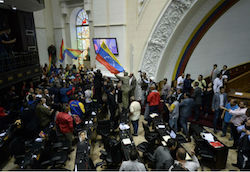Venezuela’s opposition-controlled National Assembly declared that the country has suffered a coup after the government blocked efforts to push for a recall of the president, deepening a political crisis that is fueling criminal activity in Venezuela.
In an emergency session on October 23, the coalition of opposition parties that dominates Venezuela’s National Assembly passed a resolution calling for the restoration of constitutional order in the country.
Despite efforts to shut down the debate by pro-government protesters who stormed the chamber, the Assembly drafted a three-page document stating there had been a “rupture of constitutional order” and a “coup d’etat committed by the government of President Nicolas Maduro.” The resolution came in response to events last week when Venezuela’s National Electoral Council (Consejo Nacional Electoral – CNE) shut down attempts to organize a recall referendum that could have removed Maduro from office.
The document calls for a special session to debate the position of President Maduro and the replacement of CNE officials as well as judges in the Supreme Court, which has increasingly been used to sideline the Assembly. It also calls for intervention from the international community to protect democracy in Venezuela and for the army to disobey any orders that are unconstitutional or undermine citizens’ rights.
Maduro responded to the events with a statement accusing the opposition of “trying to take over power by unconstitutional means,” reported the BBC.
InSight Crime Analysis
Venezuela’s political crisis has the potential to affect the country’s criminal dynamic in several ways, all of which could worsen an already dire security situation.
In its attempts to cling onto power, the government has tried to circumvent the growing political influence of the opposition by empowering two distinctly undemocratic forces that are already major players in Venezuelan organized crime.
Firstly, there is the military, important factions of which appear to be deepening their involvement in the drug trade. In July, the government placed the military in charge of food distribution, expanding its social role and influence, and opening up new opportunities for corruption, theft and smuggling.
The military has the potential to act as powerbrokers in the standoff between the government and the opposition, and so securing the support of the armed forces is key — as evidenced by the opposition’s call for the military to disobey government orders. The easiest way for the government to ensure continuing military support is to offer protection to high-ranking officials involved in drug trafficking or corruption schemes in return for their loyalty, cementing the power of the most corrupt and criminal figures within its ranks.
SEE ALSO: Venezuela News and Profiles
Secondly, the government has increasingly leaned on irregular armed militias as a buffer against opposition power. InSight Crime’s investigations have revealed that this policy is encouraging criminality as some militias are using their position to control criminal economies, while criminal gangs are also posing as militias as a cover for their illicit activities.
As democratic solutions to Venezuela’s political crisis are closed off and each side becomes more entrenched in their positions, the risk of a social conflict that could further empower and enrich corrupt and criminal elements will only deepen.

